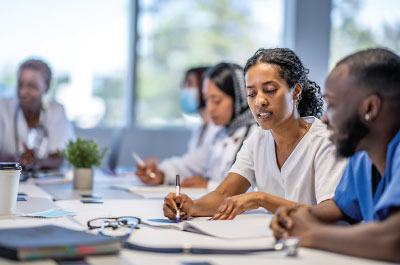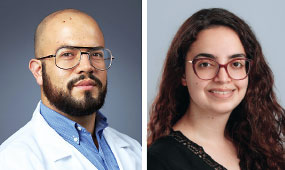A Call for Change: Reshaping the Reality for Doctors in Training
Abstract
Training institutions have an ethical responsibility to support their psychiatry residents and promote their well-being in practical ways as they juggle numerous challenges.

In November 2022, Nakita Mortimer, M.D., a first-year anesthesiology trainee, eloquently captured the complex reality that residents face, describing it as a “balancing act of two truths.” She recognized the ethical call to care for the sick as she served her Bronx community while also acknowledging the challenges that residents face to their own well-being.
Her message serves as a crucial reminder of our ethical responsibility to care for our trainees and to pay closer attention to their needs. A significant portion of the medical workforce consists of trainees. This includes interns, residents, and fellows. These individuals directly impact the quality of patient care and the future of the profession. While we take heart that some trainees are organizing to fight for fair compensation, the field of psychiatry must focus on promoting the well-being of all trainees. By prioritizing resident well-being, training programs can support their professional development, promote positive mental health, and set an admirable example for other medical specialties.
While recounting the struggles trainees face may not do justice to Dr. Mortimer’s memory or provide a complete solution, it is important to summarize the current landscape in which many trainees find themselves.
Trainees often face financial struggles, despite working long hours and bearing the emotional, mental, and physical labor required for effective patient care. The increasing cost of housing across the United States and significant burden of student loans are just two of the many financial pressures that trainees experience. The lack of fair compensation is concerning. It is difficult to imagine how trainees could have fruitful training considering their various financial discomforts.
Yet on top of that financial strain, trainees must also deal with the significant emotional challenges caused by the rigorous nature of medical training. Trainees bear witness to significant human suffering. Institutions should prioritize providing adequate support, mentorship, and discreet mental health services from external sources to address these challenges. Additionally, programs should ensure trainees receive the necessary resources and support to foster their long-term career prospects.
In addition to the challenges all trainees experience, international medical graduates (IMGs) encounter further struggles. It is vital that they are not left out of this conversation. IMGs must adapt to a different culture, language, and health care system, as well as overcome difficulties accessing necessary health care services. Moreover, they must navigate the implications of their visa status and frequently renew it, which can cause delays and hinder their timely return to their training programs. It is essential for institutions to assess whether these trainees have received adequate education regarding their rights and to support them in fulfilling administrative requirements related to their visas.
When we look at the current landscape, we are inspired by problem solvers on the ground. In June, residents and fellows at Mass General Brigham, which has one of the largest residency programs in the country, voted in favor of unionizing. In July, they demonstrated for a fair contract, demanding a living wage and other measures. We applaud these trainees. While not all unionized training programs have consistent benefits, they serve as an example of how collective action can be powerful and healing. Unions historically have fought for various benefits such as higher salaries, educational benefits, access to mental health support, a stipend for on-call meals, maternity leave support, and assistance from immigration lawyers.
APA makes significant contributions to psychiatric education and trainee empowerment, and it fits perfectly into this complex landscape. We are in need of a collective awakening, and APA members can play a vital role in this process. By advocating for resident well-being, we can contribute to improved patient care and demonstrate our commitment to promoting positive mental health among trainees. It is time for a change that ensures the well-being of all trainees and transforms our world. ■




